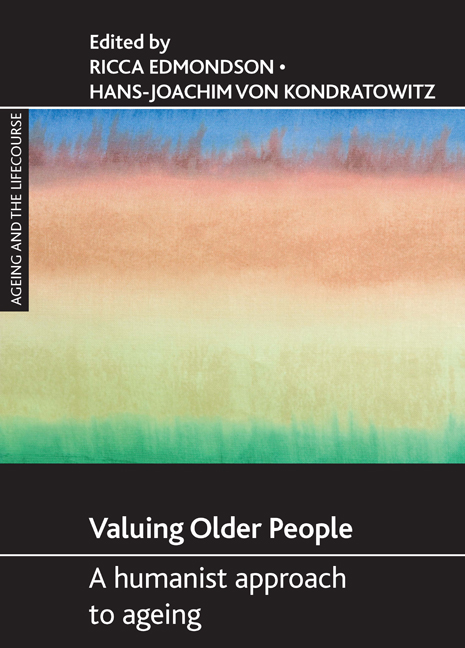Book contents
- Frontmatter
- Contents
- List of tables and figures
- Notes on contributors
- Acknowledgements
- Foreword
- Introduction
- Part One Religion, spirituality, cultural resources and creating meaning
- Part Two Norms, values and gerontology
- Part Three Ageing and wisdom? Conflicts and contested developments
- Afterwords
- Index
- Available titles in the Ageing and the Lifecourse series
one - Religious belonging and spiritual questioning: a Western European perspective on ageing and religion
Published online by Cambridge University Press: 05 July 2022
- Frontmatter
- Contents
- List of tables and figures
- Notes on contributors
- Acknowledgements
- Foreword
- Introduction
- Part One Religion, spirituality, cultural resources and creating meaning
- Part Two Norms, values and gerontology
- Part Three Ageing and wisdom? Conflicts and contested developments
- Afterwords
- Index
- Available titles in the Ageing and the Lifecourse series
Summary
Introduction: ageing, religion and tradition
Social change provides a double challenge to the ageing person. Older people are expected to give witness to what has been important in their lives and what is of lasting value. They need to do this also for maintaining their own sense of identity. At the same time their own adaptation to new times and customs requires that they acknowledge and accept inevitable change. To deny change is not an option, for life necessarily involves change. Balancing these two needs and requirements is no easy task, particularly in today's fast-altering society.
In traditional societies, value identification is closely associated with socialisation to the religious beliefs of the group's culture. Older members usually play a major role in this process, by articulating and giving witness to the value choices that they have made in the course of their lives, and to the religious underpinning of these values. Such witness helps reinforce younger people in the often hard, because self-denying, character of the choices that they need to make (Gutmann, 1997).
In modern and postmodern societies, however, such processes of value transmission and witness have become immeasurably more complicated, and both older and younger people have had to come to terms with a greater plurality of value choices in the often fast-changing societies in which they live – which contain people of various as well as no religious commitments. Not only does this greater flux appear to threaten any continuing role that older people might have in transmitting beliefs and values to the younger generation, it can also lead them to question their own faith as well as their value choices – at a time of life when renewal might seem implausible (Coleman and O’Hanlon, 2004).
Religious doubt is still often perceived as an abnormal state in later life. Faith, it might be thought, should grow stronger, not weaker, as death approaches. Indeed the empirical evidence suggests that the health benefits of religious belief and practice, from quicker recovery from physical and mental illness to lowered mortality rates, are at their strongest among older age groups (McFadden and Levin, 1996). There are a number of theoretical considerations that would explain these findings.
- Type
- Chapter
- Information
- Valuing Older PeopleA Humanist Approach to Ageing, pp. 23 - 36Publisher: Bristol University PressPrint publication year: 2009



